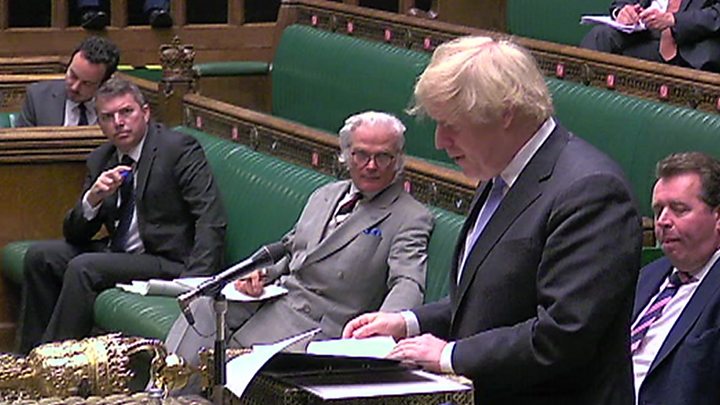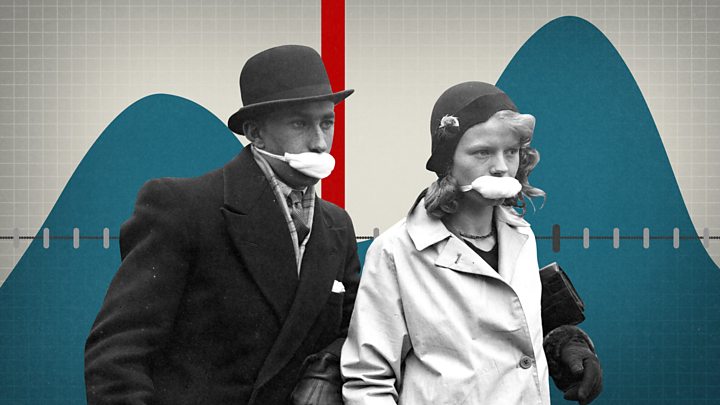Health leaders are calling for an urgent review to determine whether the UK is properly prepared for the “real risk” of a second wave of coronavirus.
In an open letter published in the British Medical Journal, ministers were warned that urgent action would be needed to prevent further loss of life.
The presidents of the Royal Colleges of Surgeons, Nursing, Physicians, and GPs all signed the letter.
It comes after Boris Johnson announced sweeping changes to England’s lockdown.
The Department of Health said it would continue to be guided by the latest scientific advice and would give the NHS “whatever it needs”.
On Tuesday, the prime minister said pubs, restaurants, cinemas and hairdressers will be able to reopen from 4 July.
The 2m social-distancing rule will be replaced with a “one-metre plus” rule, meaning people should stay at least 2m apart where possible, but otherwise should remain at least 1m apart while taking steps to reduce the risk of transmission, such as wearing face coverings.
The 2m rule will remain in Scotland, Wales, and Northern Ireland, however.
Both the government’s chief scientific adviser Sir Patrick Vallance and the chief medical officer for England Professor Chris Whitty stressed Mr Johnson’s plan was not “risk-free” at Tuesday’s final daily Downing Street coronavirus briefing.
Following the announcement, health leaders called for a “rapid and forward-looking assessment” of how prepared the UK would be for a new outbreak.
“While the future shape of the pandemic in the UK is hard to predict, the available evidence indicates that local flare-ups are increasingly likely and a second wave a real risk,” they wrote.
“Many elements of the infrastructure needed to contain the virus are beginning to be put in place, but substantial challenges remain.”
The authors of the letter, also signed by the chair of the British Medical Association, urged ministers to set up a cross-party group with a “constructive, non-partisan, four nations approach”, tasked with developing recommendations.
“The review should not be about looking back or attributing blame,” they said, and instead should focus on “areas of weakness where action is needed urgently to prevent further loss of life and restore the economy as fully and as quickly as possible”.
Conservative MP Bernard Jenkin, chairman of the liaison committee, told BBC Two’s Politics Live he supported a “lessons learned” enquiry and had broached the subject with the government following the BMJ letter.
He said it wasn’t a “full-blooded inquiry but “about setting up a process that learns lessons”.
He said: “If you look at the papers the Cabinet Office had going into this [pandemic], there was nothing about massive PPE procurement; there was nothing about massive tracking and tracing and testing; there was nothing about a lockdown.
“This has turned out to be a massively different pandemic than the government was prepared for.”
Former Conservative health secretary Jeremy Hunt told BBC Radio 5 Live’s Emma Barnett that he did not think it was the right time for a public inquiry, which would take up a lot of ministerial time. But he thought there was a “very real risk” of a second wave.
Pointing to an outbreak at a meat processing plant in Germany and South Korea having to trace 1,700 contacts after an incident at a nightclub, he said: “In the places which are the best in the world they are dealing with these spikes and we have to recognise there is a very real risk of that here too.”
Talk of a dreaded second wave will dominate the coming weeks and months.
The UK will need to be prepared for one. But as the health leaders acknowledge, it’s not possible to predict for sure if one will actually happen.
What is certainly a given, is there will be local flare-ups where we see clusters of infections in places. This has already happened in Leicester, Anglesey and Cleckheaton.
But what is important to recognise is that the UK is in a completely different position to where it was in March when the first wave hit.
Testing capacity has gone from a few thousand a day to 200,000 to identify those infected. There is a network of contact tracers to find those that might be infected.
There are still weaknesses – some tests take too long to turnaround, while the tracing system is still bedding in and the app is not ready.
But there is a realistic chance if these continue to improve and, importantly, the public keeps playing its part by both continuing to adhere to social distancing and complying with requests to self-isolate if they test positive or are identified as a close contact of an infected person, that the virus will be largely kept at bay.
Read more analysis from Nick here.
A Department of Health spokesperson said: “Thanks to the dedication of NHS staff, hospitals have not been overwhelmed and intensive care capacity continues to meet the needs of patients.
“Effective local management of any outbreak is the first line of protection against a second wave. In the event the local response is not sufficient to contain outbreaks, the government would reintroduce measures if necessary to contain the virus and stop it spreading to the wider population.”
In the Commons on Tuesday, Mr Johnson said he did not believe there was “a risk of a second peak of infections that might overwhelm the NHS”.

Media playback is unsupported on your device
Announcing the biggest easing of lockdown yet, he said two households in England would be able to meet indoors and stay overnight – with social distancing.
He warned all the steps were “reversible” but confirmed the following venues could reopen:
- Pubs, bars and restaurants but only with a table service indoors, and owners will be asked to keep contact details of customers to help with contact tracing
- Hotels, holiday apartments, campsites and caravan parks but shared facilities must be cleaned properly
- Theatres and music halls but they will not be allowed to hold live performances
- In other changes weddings will be allowed to have 30 attendees, and places of worship will be allowed to hold services but singing will be banned
- Hair salons and barbers will be able to reopen but must have protective measures, such as visors, in place
- Libraries, community centres and bingo halls
- Cinemas, museums and galleries
- Funfairs, theme parks, adventure parks, amusement arcades, outdoor skating rinks and model villages
- Indoor attractions where animals are exhibited, such as at zoos, aquariums, farms, safari parks and wildlife centres
Some other venues will remain closed by law, including nightclubs, casinos, indoor play areas, nail bars and beauty salons, swimming pools and indoor gyms.
Those businesses set to reopen in 10 days’ time have been given government guidance on how they can operate as safely as possible during the coronavirus pandemic.

Media playback is unsupported on your device
It comes as struggling retailers must pay their quarterly rent to landlords on Wednesday.
Scottish First Minister Nicola Sturgeon has announced an updated route map for leaving lockdown with five-mile travel restrictions to end on 3 July and the reopening of self-catering accommodation.
From 6 July outdoor hospitality areas such as beer gardens will be able to open. People will be able to meet indoors from 10 July.
Professor John Edmunds, who attends Scientific Advisory Group for Emergencies (Sage) meetings, said the switch to “one metre-plus” restrictions, plus the reopening of pubs and restaurants, meant a risk “transmission will take off again” and the Test and Trace system had to be “working well” to stamp out infections.
Both Labour and Mr Hunt are calling for NHS staff to be tested every week for coronavirus so that patient waiting list backlogs can be safely cleared.
The latest figures show a further 171 people had died after testing positive for coronavirus in the UK, taking the total to 42,927.
- CORONAVIRUS NEWSCAST: Evan Davis takes the temperature of the economy
- SEAN PENN: The Hollywood actor’s role in getting Americans tested
What questions do you have about the relaxation of lockdown measures and Covid-19?
In some cases your question will be published, displaying your name, age and location as you provide it, unless you state otherwise. Your contact details will never be published. Please ensure you have read our terms & conditions and privacy policy.
Use this form to ask your question:
If you are reading this page and can’t see the form you will need to visit the mobile version of the BBC website to submit your question or send them via email to YourQuestions@bbc.co.uk. Please include your name, age and location with any question you send in.
